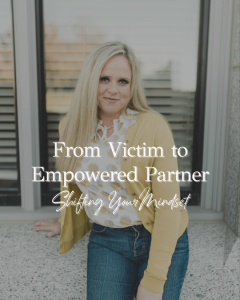
When something negative happens, our brains automatically make up a story to protect us. What are the stories that you tell yourself to protect yourself from feeling negative emotions? What stories disengage you from your spouse or make them into a villain? While this is a great way to protect ourselves, it takes us further away from creating the emotional intimacy and connection that we all crave in our relationships. So what stories are you telling yourself?
Show Notes:
Follow Amanda on Facebook and Instagram.
Join Amanda’s Private Facebook Group.
Show Summary:
So I was listening to another podcast on marriage and the couple that host it were talking about the stories that we tell ourself. And I thought that would be a great topic for today’s episode.
So on the podcast the couple was talking about an episode that happened to them last week and how they worked it out. It was late at night and the wife said “don’t worry about the kitchen, I’ll clean it in the morning”
The next morning, she was going to get around to it. The kitchen was stressing the husband out and so he tried to be really nice and kind and say “Hey, did you say you were going to clean the kitchen?”
Well the story she told herself was that “he was trying to micromanage her and that he thought she was lazy and incompetent.”
The story he was telling himself was that “he was just asking a question and tried to say it nicely and now she’s all mad at him.”
So they were both able to voice the stories that they were telling themselves and see how the OTHER person was interpreting it and come to a more peaceful resolution, rather than just being mad at the other person.
I thought this was a great example of the stories that we tell ourselves about our relationships and that most often, are totally untrue.
I know I am guilty of this A LOT. It’s something that I am trying to work on, but my brain is always offering me these thoughts, trying to protect me from feeling hurt, and the thoughts are often more painful than just figuring out what the truth is.
Brene Brown talks about this. She says “Storytelling helps us all impose order on chaos, including emotional chaos. When we’re in pain, we create a narrative to help us make sense of it. This story doesn’t have to be based on any real information. It’s often just about self-protection.”
She goes on to say that our brain makes up these stories so that we can be mad instead of admitting we are feeling vulnerable or inadequate. It engages that fight or flight mechanism. When our brain determines that we are under threat we run (or disengage from the relationship to protect ourselves) or we fight (we find someone to blame).
But, doing this with our spouse can create a dangerous dynamic. If every time something happens with our partner we let our brain create a story that engages the fight or flight mechanism, we are constantly disengaging from our spouse, OR making them into a villain in our narrative. Not good.
So how do we change this? How do we rewrite these stories? Brene Brown says that “We just have to be brave enough to reckon with our deepest emotions.”
Whoa…reckon with our deepest emotions? That is HARD and uncomfortable.
So how do we do that? You first need to acknowledge your feelings and get curious about the story or the thoughts that are prompting them. When you can challenge those thoughts, then you can get to the truth.
So let’s use an example.
Husband comes home from work and says “What’s for dinner?” when there is obviously no cooking going on in the kitchen.
Wife immediately responds in a snappy tone “I’ve had a crazy day with the kids. You know you can fix dinner sometimes too!”
So let’s examine here…
- Engage with your feelings – you may not even understand where they are coming from at this point, just acknowledge you are having an emotional reaction. Name those feelings. Are you angry, frustrated, irritated, guilty? What it is? How does it feel in your body?
- Get Curious about the story or the thoughts behind the feelings – to do this you may want to ask yourself a few questions.
- What is really going on here?
- What happened right before?
- What thought is making me feel this way?
Sometimes its hard to get to the bottom of it. Getting curious about our feelings can often lead us down a path we really don’t like going because it can be uncomfortable. But pushing through that discomfort is how we get to the truth.
- Write it down – The best way to really become aware of what is going on in our brains is to write it down. Get it on paper. We are much more able to examine what is truly going on when its out of our head and on a piece of paper. I call this a thought download. I do it with all my clients and I personally do a thought download at least daily. Just to evaluate where my brain is at and get a handle on it. You can’t examine your brain and what is going on inside it from the inside. You HAVE to get it down on paper. Some helpful questions to get you started are
- The story I’m making up is…
- My emotions are…
- My thinking is…
- My beliefs are….
- My body is….
- My actions are…
So in this situation, the wife may write down “I’m so angry. He doesn’t see all that I do. Nothing is ever good enough. Why can’t he just help out sometimes? Why can’t he see all that I’m dealing with. He doesn’t understand my life and everything I do.” or something like that.
When you are doing a thought download, don’t filter…just write.
- The next thing is to examine your findings without judgement. It it true? Is it really? What are the facts and what are just my thoughts? What don’t I know about? What am I really feeling? What part did I play in this?
Now doing this, you may find some things you don’t really like. Shame. Judgement. Guilt. Vulnerability. None of those emotions are easy. But when you see that this is truly a story you are telling yourself and can distinguish the truth from the story, you can get your power back. The truth can be uncomfortable, but it is the basis for meaningful change. And just remember, these are JUST emotions. When you are willing to FEEL any emotion, those negative emotions aren’t so scary. Your brain will tell you that those negative emotions are scary and you might die if you feel them. But you won’t. Just be willing to get uncomfortable.
So in this example – the wife can then go back through and say “He didn’t say it wasn’t good enough. He just asked a question. I’m the one who made it mean all sorts of things about me.” Then hopefully she goes back to her husband, says “the story I was telling myself was…. but I when I really thought about I realized you weren’t actually saying that.” and hopefully apologizes and he forgives her and they make dinner together.
Facing our true selves takes courage. It’s not an easy thing most of the time. We don’t like seeing some of those parts of ourselves. But to truly bring our best self to our marriage, figuring out what that is, is necessary and important. Doing the work to improve our thought processes and the stories that we tell ourselves is important.
Too many times, couples don’t do the work and there is such disengagement in the marriage. There’s a lack of a connection because they aren’t being true to themselves. And how can you share yourself with another person when you aren’t willing to look at who you really are, how you are behaving, and how you are showing up in your marriage? You can’t. You can not create the emotional intimacy that we all crave when you are holding back parts of yourself. And not being willing to face those emotions is holding part of yourself back from your spouse.
This is the work that I do with my clients. Sometimes its hard to see where we are getting in our own way. And we need another perspective. We need someone to help us see where we can make changes to show up as our best self in our marriage.



